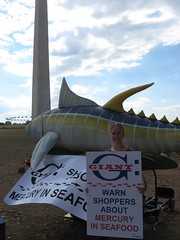Arlington County has just released a draft version of its Master Transportation plan, and from an environmental perspective, there's an awful lot to like about it.
The plan emphasizes
complete streets, environmental sustainability, and reducing reliance on single-occupancy vehicles. Arlington is one of the few communities in the region to recognize you can't pave your way out of transportation problems. New roads fill up just as quickly as they're built, because especially in a fast-growing area like DC, traffic is like a gas -- it expands to fill all available space.
Arlington has committed to smart growth, centering development around Metro stations. Communites like Loudoun and Fairfax Counties have let single-occupant vehicles drive their development, and now find themselves trying to come up with more money to build ever-wider roads. But in Arlington, despite a massive increase in population along the Rosslyn-Ballston corridor, traffic on Wilson Blvd. isn't much worse than it was 20 years ago.
However, the plan has its drawbacks. While it calls for bringing Arlington into compliance with federal air quality standards, it's only a brief mention. Such a huge problem is going to take years of work and a lot of tough choices to solve. And with Maryland planning to build the Intercounty Connector and Virginia planning to expand the Beltway and I66, it doesn't look like our region's leaders have the stomach to take stands they perceive as politically unpopular.
Then there's the elephant in the room, saved for the last two paragraphs of the 24-page overview: "Identifying funding sources for the wide array of projects and programs recommended in the MTP will also be a challenge. ... The next steps in the MTP process will include prioritizing the recommendations provided in the plan and its supporting elements and the determination of short, mid and long term priorities given current and future funding limitations."
Those two little sentences threaten to undo all that came before them. As
the Arlington Connection has reported, lack of funding already threatens to bring pedestrian- and bike-friendly improvements to a screeching halt. With Virginia's House Republicans refusing to raise taxes for transportation improvements, available funds are going to finish already-strarted projects and to maintain existing roads. And when budget priorities are assigned in this transportation plan, environmental projects and alternative transportation could be the first thing to go.
For more details, you can visit
Arlington Master Transportation Plan's website, or just
read the overview.
UPDATE: I'm quoted in the
DC Examiner's article on the plan (note the misspelled name).
 Countless "objective" journalists advocate for mammograms to stop breast cancer.
Countless "objective" journalists advocate for mammograms to stop breast cancer.




